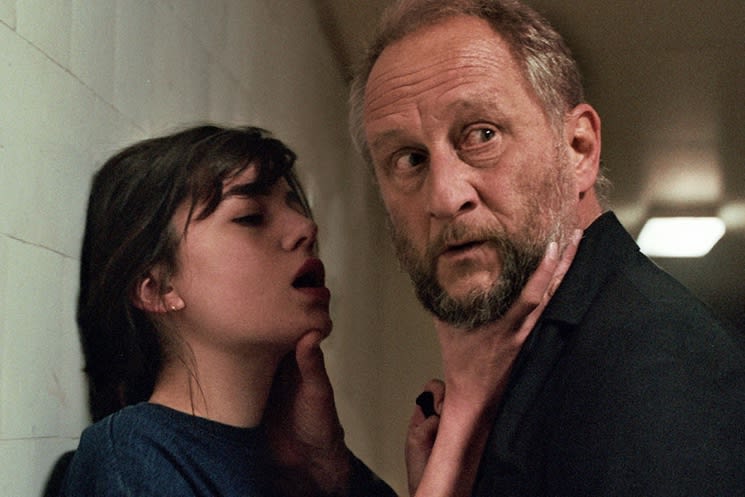Fabrice Du Welz's Inexorable is messed up in that deeply Catholic way that will make you feel guilty for even watching it. This slow-burning thriller will set over audiences like a pall, simultaneously repelling and intriguing viewers with every subsequent scene.
Author Marcel Bellmer (Benoît Poelvoorde) and his publisher wife Jeanne (Mélanie Doutey) move into Jeanne's dad's old, roaming manor in the French countryside with their daughter. After writing a bestseller, Marcel is plagued by writer's block while working on his next novel, as he is overwhelmed by high expectations and his publisher father-in-law's invisible, expectant presence. Enter Gloria (Alba Gaïa Bellugi), a mysterious wandering girl who seemingly accidentally comes into the couple's life to help look after their young daughter. What follows is a series of increasingly unfortunate and existentially terrifying events that threaten to unearth old secrets and ruin Marcel's life in both material and psychological ways.
From the first moment, young Gloria is a femme fatale whose relationship with Marcel is that of obsession: she is fixated on Marcel in that fanatical way that readers become fixated on writers. Marcel is a god to her — and in the way that nuns can have an erotic and filial relationship with god, so too does Gloria lust after the much older Marcel. Jeanne senses Gloria's threat, but doesn't want to acknowledge it.
The tight-rope negotiation of moral ground that Gloria, Marcel, and Jeanne perform is mirrored by the effect the film has on viewers. Marcel is intrigued by Gloria in the way that we are intrigued by the film; Marcel moves toward Gloria even as responsibility to his family snags at his conscience, much in the way that the film repels us morally — which is exactly what keeps us watching.
Technically, Inexorable is well-done. Du Welz is an excellent director, and cinematographically and sonically, it's impeccably put together. But it's also really unsettling in a way that will leave audiences wondering — is it good or bad? At the least, it's very fucked up.
(Frakas Productions)Author Marcel Bellmer (Benoît Poelvoorde) and his publisher wife Jeanne (Mélanie Doutey) move into Jeanne's dad's old, roaming manor in the French countryside with their daughter. After writing a bestseller, Marcel is plagued by writer's block while working on his next novel, as he is overwhelmed by high expectations and his publisher father-in-law's invisible, expectant presence. Enter Gloria (Alba Gaïa Bellugi), a mysterious wandering girl who seemingly accidentally comes into the couple's life to help look after their young daughter. What follows is a series of increasingly unfortunate and existentially terrifying events that threaten to unearth old secrets and ruin Marcel's life in both material and psychological ways.
From the first moment, young Gloria is a femme fatale whose relationship with Marcel is that of obsession: she is fixated on Marcel in that fanatical way that readers become fixated on writers. Marcel is a god to her — and in the way that nuns can have an erotic and filial relationship with god, so too does Gloria lust after the much older Marcel. Jeanne senses Gloria's threat, but doesn't want to acknowledge it.
The tight-rope negotiation of moral ground that Gloria, Marcel, and Jeanne perform is mirrored by the effect the film has on viewers. Marcel is intrigued by Gloria in the way that we are intrigued by the film; Marcel moves toward Gloria even as responsibility to his family snags at his conscience, much in the way that the film repels us morally — which is exactly what keeps us watching.
Technically, Inexorable is well-done. Du Welz is an excellent director, and cinematographically and sonically, it's impeccably put together. But it's also really unsettling in a way that will leave audiences wondering — is it good or bad? At the least, it's very fucked up.
